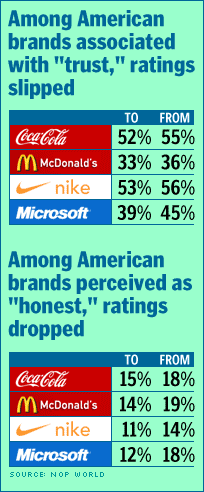NEW YORK (CNN/Money) -
Diminishing respect for American culture and values is putting U.S. brands at greater risk overseas, according to a worldwide annual study of consumer sentiment.

"Our study has found that there's declining awareness, popularity and usage of U.S. brands," said Tom Miller, global managing director of market research consultant NOP World.
"In a nutshell, there's growing resentment and envy among global consumers toward the U.S., and that sentiment is manifest in an erosion of support for American products," said Miller. "The danger here is that even a 1 or 2 percentage point decline is not good news for companies that want to grow."
According to the study -- conducted before news of the prison abuse scandal broke late last month -- the total percentage of consumers worldwide who use U.S. brands has fallen to 27 percent from 30 percent a year ago across 15 brands surveyed, including McDonald's, Coca-Cola, Microsoft, Yahoo!, Disney and Nike.
And year-over-year comparisons also showed that those responding put less trust in American brands.
The percentage of those saying they "trust" Coca-Cola fell to 52 from 55 percent, McDonald's to 33 from 36 percent and Nike to 11 from 14 percent, according to the study, entitled "America, the World, and the New Challenges for Global Brands."
The report also showed that over a five-year period, perception of values attributed to American culture have changed significantly since 1999. When consumers were asked to rank values attributed to American culture, "internationalism" dropped to 29th from 11th, "equality" dropped to 42nd from 28th, and "excitement" fell to 27th from 14th.
The survey, conducted between January and March 2004, polled 30,000 consumers in 30 countries outside the United States.
The study, based on anecdotal evidence rather than actual sales data, suggested that the U.S. military engagements in Iraq and Afghanistan were among the factors contributing to negative attitudes worldwide toward U.S. products.
"The feeling that the U.S. is the only remaining superpower makes people nervous," said Miller. "Added to that is the perception that the United States acted unilaterally going into Iraq, that it abandoned the Kyoto environmental agreement and the ABM [Anti-Ballistic Missile Treaty], (and that) has built up resentment against the country."
The warning signs are in place that things could get worse, said Miller. "The question is how bad, and for how long."
On Thursday, a bomb exploded outside a McDonald's restaurant in Istanbul, Turkey. Separately, Italian authorities defused two homemade bombs outside one of the company's restaurants in Rome.
McDonald's, in an e-mail Friday responding to questions from CNN/Money, said Thursday's events were "two local, isolated incidents that are being handled by the local authorities."
Separately, McDonald's CEO Charlie Bell said the company's overseas franchises are "a proud symbol of America," that made it an occasional target of such incidents. "We take this very seriously," he said, speaking at the company's annual meeting of shareholders' at corporate headquarters in Oak Brook, Ill.
Miller would not comment specifically on Thursday's bombing, although he said the events in recent weeks, including the scandal involving Iraqi prisoners, would serve to exacerbate anti-American attitudes.
"I can't quantify it, but I can speculate that feelings would have worsened over the last month and a half," Miller said.

|

